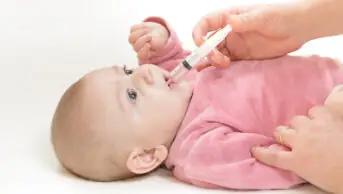
Shutterstock.com
A shorter course of antibiotics is as effective as a longer course in children with non-severe community-acquired pneumonia (CAP), an analysis of nine randomised controlled trials (RCTs) has concluded.
The systematic review and meta-analysis, published in JAMA Pediatrics on 14 November 2022, comprised nine RCTs comparing a shorter course (e.g. three days vs. five to ten days, and five days vs. seven to ten days) with a longer course of therapy, using the same oral antibiotic for children with non-severe CAP.
The analysis comprised a total of 11,143 children with non-severe CAP, 98% of whom were aged 2–59 months. The majority of trials considered prescribing of amoxicillin, but two looked at co-trimoxazole.
The researchers found that, across the trials, treatment failure occurred in 12.8% versus 12.6% of participants randomised to a shorter versus a longer course of antibiotics. This, they said, provided “high-quality evidence” that a shorter course of oral antibiotic was non-inferior to a longer course, with respect to treatment failure for children with non-severe CAP (risk ratio, 1.01; 95% confidence interval [CI], 0.92–1.11; risk difference, 0.00; 95% CI, –0.01 to 0.01).
They calculated that a three-day course of antibiotic treatment was non-inferior to a five-day course for the outcome of treatment failure (risk ratio, 1.01; 95% CI, 0.91–1.12), and a five-day course was non-inferior to a ten-day course (risk ratio, 0.87; 95% CI, 0.50–1.53).
The shorter courses of antibiotics were also associated with fewer adverse reactions, such as gastroenteritis and rash, lower caregiver absenteeism and reduced medical costs.
“Clinicians should consider prescribing a shorter course of antibiotics for the management of paediatric non-severe CAP in accordance with antimicrobial stewardship principles,” the authors concluded.
Commenting on the analysis, Steve Tomlin, director of the Children’s Medicines Centre at Great Ormond Street Hospital, said: “CAP can be very serious and lead to death, but non-serious CAP is very common in children.
“Shorter courses of antibiotics have been discussed for a while and this study is a good confirmation that short courses do work and I believe should be considered.”
“The benefits of short courses are well described in the article, but there are often concerns of CAP becoming severe. The question is primarily about how do we prevent the very odd severe occurrence being under treated.
“Moving to shorter courses should be considered, but we must watchful for recurrence and the deteriorating child if we take this route — at least initially,” he added.


